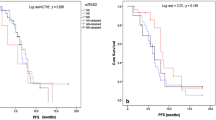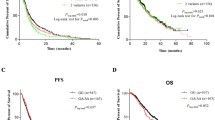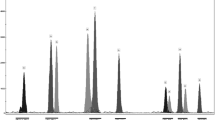Abstract
DNA repair plays a key role in prevention of carcinogenesis and one of the most important DNA repair mechanisms is nucleotide excision repair (NER) pathway. This pathway includes a number of genes such as excision repair cross-complementing group 1 (ERCC1) gene which are responsible for the 5′ incision of damaged DNA. A reduced DNA repair capacity associated with ERCC1 mRNA level has been observed in lung carcinogenesis. Two single nucleotide polymorphisms (SNPs) in ERCC1 gene, T19007C (rs11615) and C8092A (rs3212986), reportedly predict to affect the mRNA of ERCC1 in non-small cell lung cancer (NSCLC). To examine the role of two common SNPs in ERCC1 gene further, we conducted this study where 80 cases histopatologically diagnosed as NSCLC were genotyped. Genomic DNA was extracted from formalin-fixed, paraffin embedded tissues and two SNPs were analyzed using real-time PCR. The distributions of TT, TC, and CC genotypes of the T19007C SNP were 40, 44 and 16%, respectively. Significantly increased frequency of the patients carrying at least one 19007C allele was observed in early stage compared to advanced stage (P = 0.002). And also, the frequency of TC and CC genotypes significantly increased in younger patients compared to older patients (P = 0.035). Regarding C8092A SNP, the distribution of CC, CA, and AA genotypes was 38, 51 and 11%, respectively. There was no significant difference in the genotype distribution between C8092A SNP and clinicopathological parameters. This study indicated that harboring at least one 19007C allele may have protective effect in NSCLC.

Similar content being viewed by others
References
World Health Organization (2009) Fact Sheet no: 297. http://www.who.int/cancer/en. Accessed Feb 2009
Ministry of Health Republic of Turkey (2009) Cancer statistics in Turkey. http://www.kanser.gov.tr. Accessed Dec 2010
Ahlquist DA (2010) Molecular detection of colorectal neoplasia. Gastroenterology 138:2127–2139
Da Silva L, Lakhani SR (2010) Pathology of hereditary breast cancer. Mod Pathol 23:46–51
Chirieac LR, Dacic S (2010) Targeted therapies in lung cancer. Surg Pathol Clin 3:71–82
Hoeijmakers JH (2001) Genome maintenance mechanisms for preventing cancer. Nature 411:366–374
Shuck SC, Short EA, Turchi JJ (2008) Eukaryotic nucleotide excision repair: from understanding mechanisms to influencing biology. Cell Res 18:64–72
Park CH, Bessho T, Matsunaga T, Sancar A (1995) Purification and characterization of the XPF-ERCC1 complex of human DNA repair excision nuclease. J Biol Chem 270:22657–22660
Niedernhofer LJ, Odijk H, Budzowska M, van Drunen E, Maas A, Theil AF et al (2004) ERCC1–XPF is required to resolve DNA interstrand cross-link-induced double-strand breaks. Mol Cell Biol 24:5776–5787
Cummings M, Higginbottom K, McGurk GJ, Wong OG, Köberle B, Oliver RT et al (2006) XPA versus ERCC1 as chemosensitising agents to cisplatin and mitomycin C in prostate cancer cells: role of ERCC1 in homologous recombination repair. Biochem Pharmacol 72:166–175
Park CJ, Choi BS (2006) The protein shuffle. Sequential interactions among components of the human nucleotide excision repair pathway. FEBS J 273:1600–1608
Isla D, Sarries C, Rosell R, Alonso G, Domine M, Taron M et al (2004) Single nucleotide polymorphisms and outcome in docetaxel cisplatin treated advanced NSCLC. Ann Oncol 8:1194–1203
Zhou W, Liu G, Park S, Wang Z, Wain JC, Lynch TJ (2005) Gene-smoking interaction associations for the ERCC1 polymorphisms in the risk of lung cancer. Cancer Epidemiol Biomarkers Prev 14:491–496
Zienolddiny S, Campa D, Lind H, Ryberg D, Skaug V, Stageland L et al (2006) Polymorphisms of DNA repair genes and risk of non-small lung cancer. Carcinogenesis 27:560–567
Takenaka T, Yano T, Kiyohara C, Miura N, Kouso H, Ohba T et al (2009) Effects of Excision Repair Cross-Complementation Group 1 (ERCC1) single nucleotide polymorphisms on the prognosis of non-small cell lung cancer patients. Lung Cancer 67:101–107
Yu JJ, Lee KB, Mu C, Li Q, Abernathy TV et al (2000) Comparison of two human ovarian carcinoma cell lines (A2780/CP70 and MCAS) that are equally resistant to platinum, but differ at codon 118 of the ERCC1 gene. Int J Oncol 16:555–560
Chen P, Wiencke J, Aldape K, Kesler-Diaz A, Miike R, Kelsey K et al (2000) Association of an ERCC1 polymorphism with adult-onset glioma. Cancer Epidemiol Biomarkers Prev 9:843–847
Travis WD, Brambilla E, Müller-Hermelink HK, Haris CC (2004) Tumours of the lung. In: World Health Organization Classification of Tumours: Pathology and Genetics—Tumours of Lung, Pleura, Thymus, and Heart. Lyon, pp 10–11
Cheng L, Spitz MR, Hong WK, Wei Q (2000) Reduced expression levels of nucleotide excision repair genes in lung cancer: a case-control analysis. Carcinogenesis 21:1527–1530
Spitz MR, Wei QY, Dong Q, Amos CI, Wu XF (2003) Genetic susceptibility to lung cancer: the role of DNA damage and repair. Cancer Epidemiol Biomarkers Prev 12:689–698
Butkiewicz D, Rusin M, Sikora B, Lach A, Chorąży M (2010) An association between DNA repair gene polymorphisms and survival in patients with resected non-small cell lung cancer. Mol Biol Rep. doi:10.1007/s11033-010-0674-1
Zhou W, Gurubhagavatula S, Liu G, Park S, Neuberg DS, Wain JC et al (2004) Excision Repair Cross-Complementation Group 1 polymorphism predicts overall survival in advanced NSCLC patients treated with platinum-based chemotherapy. Clin Cancer Res 10:4939–4943
Tibaldi C, Giovannetti E, Vasile E, Mey V, Laan AC, Nannizzi S et al (2008) Correlation of CDA, ERCC1, and XPD polymorphisms with response and survival in gemcitabine-cisplatin treated advanced NSCLC patients. Clin Cancer Res 14:1797–1803
Kiyohara C, Yoshimasu K (2007) Genetic polymorphisms in the nucleotide excision repair pathway and lung cancer risk: a meta-analysis. Int J Med Sci 4:59–71
Wei Q, Cheng L, Amos C (2000) Repair of tobacco carcinogen-induced DNA adducts and lung cancer risk: a molecular epidemiologic study. J Natl Cancer Inst 92:1764–1772
Matullo G, Dunning AM, Guarrera S, Baynes C, Polidoro S, Garte S et al (2006) DNA repair polymorphisms and cancer risk in non-smokers in a cohort study. Carcinogenesis 27:997–1007
Kalikaki A, Kanaki M, Vassalou H, Souglakos J, Voutsina A, Georgoulias V et al (2009) DNA repair gene polymorphisms predict favorable clinical outcome in advanced non-small cell lung cancer. Clin Lung Cancer 10:118–123
Garnis C, Lockwood WW, Vucic E, Ge Y, Girard L, Minna JD et al (2006) High resolution analysis of non-small cell lung cancer cell lines by whole genome tiling path array CGH. Int J Cancer 118:1556–1564
Yang IA, Relan V, Wright CM, Davidson MR, Sriram KB, Savarimuthu Francis SM et al (2011) Common pathogenic mechanisms and pathways in the development of COPD and lung cancer. Expert Opin Ther Targets 15:439–456
Kitamura H, Yazawa T, Okudela K, Shimoyamada H, Sato H (2008) Molecular and genetic pathogenesis of lung cancer: differences between small-cell and non-small-cell carcinomas. Open Pathol J 2:106–114
Kalikaki A, Koutsopoulos A, Trypaki M, Souglakos J, Stathopoulos E, Georgoulias V et al (2008) Comparison of EGFR and K-RAS gene status between primary tumours and corresponding metastases in NSCLC. Br J Cancer 99:923–929
Linardou H, Dahabreh IJ, Bafaloukos D, Kosmidis P, Murray S (2009) Somatic EGFR mutations and efficacy of tyrosine kinase inhibitors in NSCLC. Nat Rev Clin Oncol 6:352–366
Riely GJ, Politi KA, Miller VA, Pao W (2006) Update on epidermal growth factor receptor mutations in non-small cell lung cancer. Clin Cancer Res 12:7232–7241
Han SW, Kim TY, Jeon YK, Hwang PG, Im SA, Lee KH et al (2006) Optimization of patient selection for gefitinib in non-small cell lung cancer by combined analysis of epidermal growth factor receptor mutation, K-ras mutation, and Akt phosphorylation. Clin Cancer Res 12:2538–2544
Author information
Authors and Affiliations
Corresponding author
Additional information
All authors have equally contributed to this manuscript.
Rights and permissions
About this article
Cite this article
Koç, E., Caner, V., Büyükpınarbaşılı, N. et al. The determination of relationship between “excision repair cross-complementing group 1” (ERCC1) gene T19007C and C8092A single nucleotide polymorphisms and clinicopathological parameters in non-small cell lung cancer. Mol Biol Rep 39, 375–380 (2012). https://doi.org/10.1007/s11033-011-0748-8
Received:
Accepted:
Published:
Issue Date:
DOI: https://doi.org/10.1007/s11033-011-0748-8




